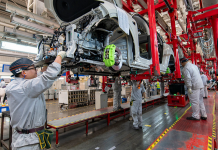NEW YORK: Private prisons in the United States have long been the topic of controversy, for example over their role in housing undocumented immigrants and asylum seekers at the U.S.-Mexico border. Several states have banned them, some banks have vowed to stop financing them and more than one presidential candidate has pledged to end them at the federal level.
During his first week in office last year, President Joe Biden signed an executive order demanding the Department of Justice not renew its contracts with privately operated criminal detention centers. The directive only covers 13 private prisons with roughly 20,000 prisoners, but in fact, the U.S. houses over 200 of said facilities, holding more than 110,000 inmates—some 8 percent of the country’s total jail population.
Private prisons can be both heaven and hell for their residents, depending on personal bank balance. Critics point out that profit motives, coupled with a lack of oversight, can create incentives to minimize costs and care for inmates.
Generally speaking, if prisoners can cough up the money, they can live in relative comfort, need not engage in heavy physical labor, and can get protection to reduce the risks of violence or abuse. If they don’t have the cash flow, they are often forced to work hard at an hourly wage far below the minimum standard in the name of “vocational training” or “reemployment projects.” Under the latters’ circumstances, sanitary conditions and food quality, too, will be inferior.
In May 2012, one private detention center in Mississippi witnessed a violent 2.5-hour riot, killing 16 inmates, because residents were dissatisfied with the living conditions and medical standards.
Under the pressure of public opinion, the Barack Obama administration put forward the goal of phasing out private prisons in 2016. Yet when Donald Trump took office in 2017, his commitment to the fight against illegal immigrants ushered in a new era of development opportunities for private prisons and newly established, privately run immigration detention facilities.
With these prisons obviously trampling American core values such as judicial justice and human rights protection, the question beckons: Why can’t they be shut down?
Packed to the rafters
The U.S. is a highly privatized society, its market economy considered capable of solving almost all problems. Throughout the 1970s and 80s, the American Government stepped up efforts to crack down on crime, the ensuing explosive increase in inmate population overwhelming the already poorly managed public prison system. Construction of new facilities would cost the taxpayer a large lump of money and the American people thus strongly opposed this, believing their taxes should go to improving education, healthcare and social welfare, rather than the suppressing and locking up of people.
Tom Beasley, then Chairman of the Tennessee Republican Party, came up with a solution: “You just sell prisons like you’re selling cars, or real estate, or hamburgers.” Inviting public bidding and transferring the job of detaining prisoners to private enterprises in the form of “service outsourcing” would surely “solve the problem.” Beasley then teamed up with two other senior Republicans to establish the first private prison in the U.S., marking the entrepreneurial account of the largest private prison enterprise in the country: the Corrections Corporation of America (CCA).
Compared with their public peers, private prisons seem to be more efficient: Statistics show that it usually takes five to six years for the government to build such a facility, while private companies only take two to three years; the operating cost of each bed in private prisons is only one 10th of that in public ones; private guards and staff do not occupy the civil service establishment, which can save state governments a lot of money.
But business people do not run prisons for charity. On the one hand, they receive government subsidies and on the other, they squeeze money out of their inmates. At present, private detention centers in the U.S. can generate over $5 billion in profits every year.
Money talks
The American double standard concerning human rights issues gives rise to many of its social problems, the controversial private prison system included. The U.S. population accounts for about 5 percent of the world’s total, but contributes more than 20 percent of imprisonment with a prison population of over 2.3 million, meaning one in 110 adults is incarcerated. According to the Prison Policy Initiative, a nonprofit organization based in America, in 2018, if all 50 U.S. states were to be regarded as sovereign countries, their internment levels would rank among the top 60 in the world.
The U.S. has always positioned itself as a “human rights defender” and frequently uses human rights as an excuse to interfere in the internal affairs of other countries. Yet it tends to turn a blind eye to the grim human rights situation within its own borders. The huge gap between rich and poor partially leads to higher crime rates among underprivileged minorities, and systematic racial discrimination exists in law enforcement and justice. For example, people of color make up approximately one third of the U.S. population under 18, but two thirds of incarcerated minors, according to the National Conference of State Legislatures, a bipartisan organization that serves the legislators and staffs of all U.S. states, in 2020. As a vulnerable group in American society, minority inmates are more prone to receiving unfair treatment in private prisons, a fact well-documented over the years.
During the Trump administration, America’s private prison companies ventured into a new business: immigration detention centers. Undocumented immigrants can be apprehended immediately, with an average length of custody of up to 51.5 days. One more day in detention, one more day in business. Compared with regular private facilities, the conditions in immigration detention centers have been called “similar to Nazi concentration camps” by first-hand witnesses.
It is worth noting that private immigration detention centers are not featured on Biden’s list of planned closures and to this day hold over 20,000 undocumented immigrants, The Washington Post reported on February 9. The editorial further stated that the U.S. should provide decent living conditions and medical care for those held in custody—arguably the bare minimum to be expected from a civilized society.
As the private prison business turns the state machinery into a profit maker, it naturally requires good relations with politicians to reduce operating costs while obtaining a steady stream of inmates from the government.
Private prison companies spend huge amounts lobbying Congress, state and local governments every year. From 2010 to 2015, the CCA and GEO Group, a publicly traded real estate investment trust that invests in private prisons and mental health facilities, spent $14.6 million on funding and lobbying government activities. Political investment, too, is essential. Senator Marco Rubio, during his tenure as speaker of the Florida House of Representatives from 2007 to 2009, promoted the state to become one of the most developed areas for private prisons nationwide; the GEO Group returned the favor by providing him with large donations.
Through contribution politics, private detention facilities can, to some extent, influence America’s prison policy and obtain more favorable legal support. These strong ties to interest groups make it difficult to completely break the shackles of private prisons—with one presidential decree. -The Daily Mail-Beijing Review News Exchange Item






